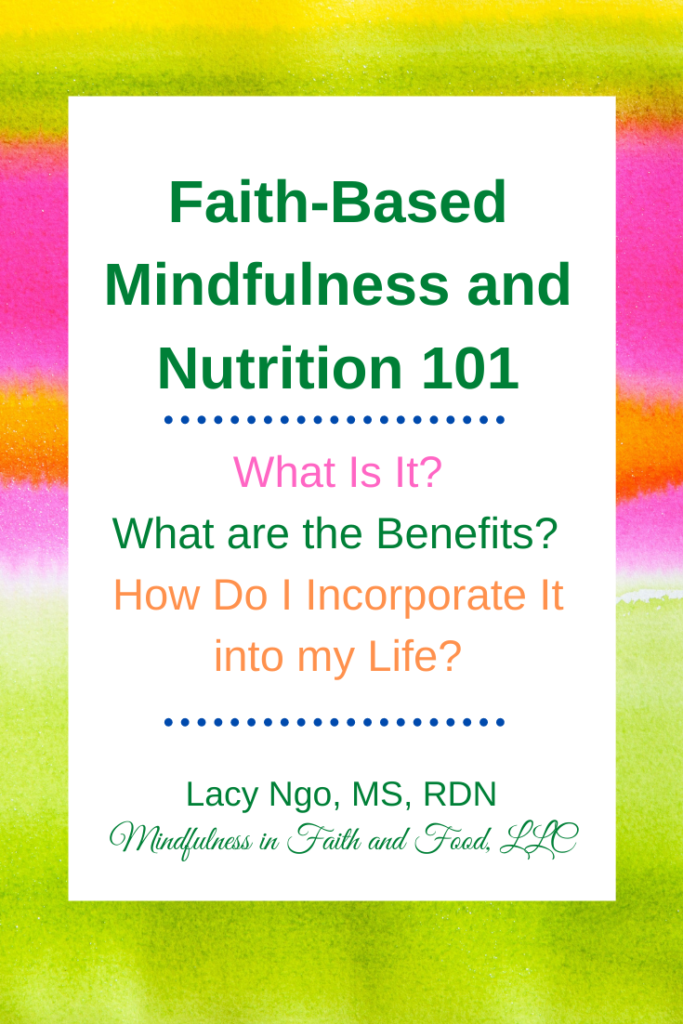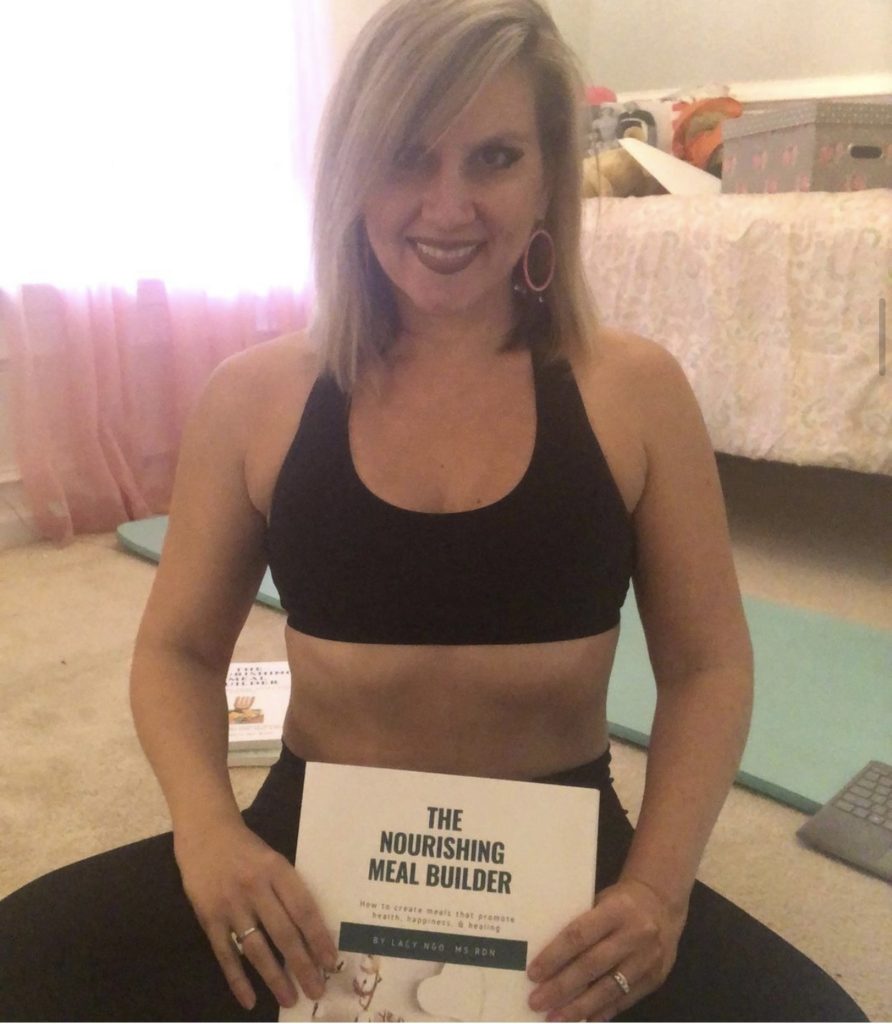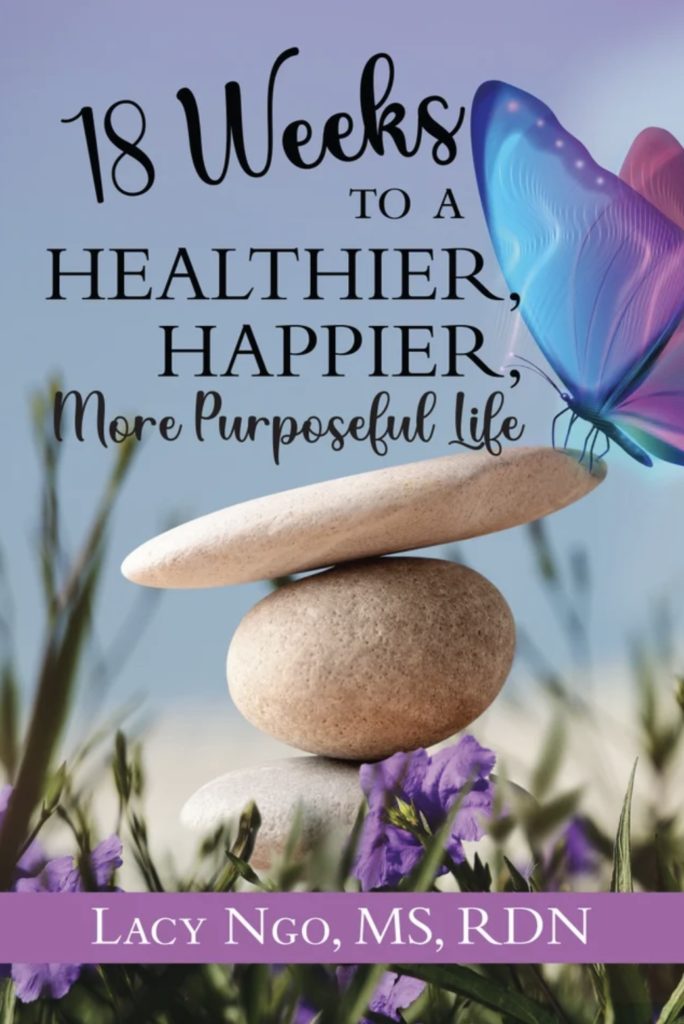What Is Faith-Based Mindfulness and Nutrition, What are the Benefits, and How Do I Incorporate It into my Life?
*This is a sneak peek into the book 18 Weeks to a Healthier, Happier, More Purposeful Life. 18 Weeks to a Healthier, Happier, More Purposeful Life was written by Lacy Ngo, a dietitian nationally recognized as a top expert in faith-based mindfulness and evidence-based nutrition. She shares the exact steps that, based on science, produce the most dramatic health and weight loss success in her book, 18 Weeks to a Healthier, Happier, More Purposeful Life. This book is like nothing you have ever seen before. It combines faith and science. Both are crucial when it comes to producing real change because real change involves the mind, body, and spirit.
Mindfulness can help with our moods, behaviors, and even our health as well! The benefits of mindfulness cannot be overstated.

This may site contains affiliate links (See full disclosure here.)
The Benefits of Mindfulness
In fact, mindfulness techniques are so beneficial that some schools have even started implementing mindfulness programs. Although more research is needed, current research indicates that implementing mindfulness programs in schools may improve social behaviors, mood, stress levels, and even academic performance and test scores. Schools are even reporting less suspensions, detentions, violent incidences, principal visits, bullying, and classroom disruptions since incorporating mindfulness programs!
If you think about it, these results make since, don’t they? Practicing mindfulness techniques can relieve stress and help us have better self-control. When we have less stress and learn to have more self-control, we tend to make better choices. Less ideal choices can sometimes cause even more stress, which brings us full circle. Furthermore, aren’t we better able to focus and learn when our brains are calm verses stressed? Mindfulness can help with stress and promote a more positive outlook on life. Less stress and more positivity promotes better health. It’s all beautifully related.
So, you can see how mindfulness activities can be so impactful, but, of course, for me, the most profound impact happens when I combine faith and mindfulness.
The Benefits of Faith-Based Mindfulness
Remember, one aspect of mindfulness is about focusing on being present. But with faith-based mindfulness, you are focusing on how God is present with you in that very moment, and while focusing on God’s presence you get to notice all the gifts from God and the beautiful little things in God’s world.
This is why Mindful Living (and mindful eating is a part of mindful living) can help you live your healthiest, happiest most purposeful life. I know, these are big words, but hear me out.
What do you want your life to look like? What about your children’s lives? Are there things you would change? What does YOUR healthiest, happiest, and most meaningful life look like? These are some of life’s biggest questions. How do we attempt to answer them?
I am a list person, so when I am asked this question, my immediate impulse is to make a list.
Sooo here is my list (Does your list look similar to mine?):
1.My greatest desire is to glorify God in all that I do. I want to show God’s love through kindness and giving. My prayer is that I listen for God’s guidance in every situation because when I listen to God, amazing things happen, and I WANT TO BE AMAZED!!!
2. I wish to have a peaceful and positive life and a grateful attitude. I want to enjoy the little moments by taking the time to notice God’s world and soak it up!
3. We humans seem to have a natural desire to work and create. We want to have meaning and purpose in our lives. This is true for me too. In my ideal life, I want to learn, grow, and work. I want to create something new, and in some small way make the world better. I want to challenge my mind through reading and learning from God and others, and I want to challenge my body through physical activity.
4. Just as I desire to work, grow, and be challenged, I equally want to have time to rest, relax, and play. Sometimes finding the time to relax is the most difficult challenge in life, and yet so important for our health and our ability to serve God and others.
5. In a nutshell, when I think about how I want to be described, I think of these words: kind and thoughtful; full of energy and light; a pleasure to be around; loyal and helpful. So trying each day to be a person with these characteristics is a life goal.
What Do We Want for Our Children?
Of course, I want these things, even more for my children. One of my greatest joys is watching my children as they feel God’s presence. They look so peaceful and content. My 2nd greatest joy is seeing my children show kindness to others, and my third greatest joy is witnessing my children living in the moment and appreciating the little things. So if we want this for our children, shouldn’t we want this for ourselves?
We may all have different wishes and desires, but when we break them down, I’m guessing that for people of faith, this list is at the heart of most of our desires.
But how do we become this person and live this healthy, happy, purposeful life? Faith-based mindfulness helps me fulfill that list like nothing else.
Here is how my life has been transformed through faith-based mindfulness:
- I listen to God more and (like the mindfulness techniques), listening to God helps me make better choices. I’m not letting negative emotions take control of my actions. (At least not as often, anyway)
- Now I am more at peace and comforted because I am noticing God is with me everywhere.
- I get to have more goose-bump-“I’m awe struck” moments because when I intentionally focus on God in the present moment, I actually see what God is doing in my life and the lives of others around me. By focusing on God in the present moment, I get to experience the feeling of amazement more often, and I WANT TO BE AMAZED!!! (Don’t we all want to be beautifully amazed?)
Do you see how all of these benefits relate back to the goals I had listed above?
The Benefits of Faith-Based Mindful Eating
When you mindfully eat, you get to experience ALL these faith-based mindfulness benefits and more. Mindful eating gives us the opportunity to focus on God’s presence, feel gratitude for God’s gift of food, and rest our brain! We get to have mini-mindfulness moments with God EVERY. TIME. WE. EAT!
With mindful breathing, we are pausing and centering out minds on one thing- breathing. When we are mindfully eating, we are still pausing and centering our brain on one thing, but this time that one thing is eating. With faith-based mindful eating, we are resting our brain by focusing on God and the food God provided.
Some of the other benefits to mindful eating are:
Relieves Stress and Promotes Better Cognitive Function:
Like the mindfulness practices above, mindful eating is a stress reliever. Have you ever noticed, we don’t seem to think or react as well on our feet when under stress. Also stress can cause weight gain so this is yet another way mindful eating helps with weight loss.
Promotes Gut Health and May Reduce the Risk of Many Chronic Conditions:
Mindful eating can aid in digestion. How? When you mindfully eat, you take your time chewing your food. Chewing thoroughly gives your stomach enzymes more surface area to do their work, which again promotes healthy digestion and absorption. Because mindful eating helps relieve stress and promotes healthy digestion and absorption, mindful eating promotes a healthy gut. Poor gut health is related to inflammation and reduced immune function. Gut health, inflammation and immunity are all linked to many conditions including IBS, Crohn’s, Autoimmune Disease, Alzheimer’s, heart disease, stroke, brain function and focus, mood and even depression and anxiety, to name a few.
So, anything that promotes a healthy gut is something worth looking into in my book. (Fortunately, a mindful eating guide IS included in my books!)
Weight Loss:
Just to recap, I don’t want to focus too much on this because different sizes can be healthy. Some people are naturally smaller and some naturally weigh more. We have different builds and genetics. Plus, other things like medications, medical conditions, and even uncontrollable seasons in life can affect weight. I also don’t want you to feel that wanting to lose weight is somehow wrong. You may want to see if weight loss will help you have more energy or help with a medical condition. Maybe you feel like you could keep up with your children more if you carried less weight or maybe you want to see if weight loss can help with joint pain. There are reasons you may desire weight loss, and fortunately mindful eating can help with weight loss while also helping you stop that food obsessing often associated with dieting. Mindful eating helps you feel full and notice your hunger/satiety cues. Moreover, the desire to binge decreases because you are actually enjoying your food ALL THE TIME.
A Note on Weight Loss from a Dietitian Who Lost 50 Pounds After She Stopped Focusing on Weight and Started focusing on Faith-based Mindfulness and Nutrition

“I find myself conflicted as I try to figure out the best way to promote the lifestyle approach I discuss in my books. You see, I am an advocate for focusing on nourishing your body while enjoying your food INSTEAD of focusing on weight loss. (The fact is health comes in different sizes.) And yet the irony is I lost over 50 pounds when I stopped thinking about weight. (I have not weighed myself in years, and I only found out about the weight loss after hearing the news at a doctor’s visit).
So when I promote my approach to health, I hesitate to show pictures of how my weight has changed, and yet since I KNOW weight loss is a benefit of this faith-based mindfulness approach, and I know this approach can and has helped others who want to lose weight, I hesitate NOT to share this weight loss benefit. So I decided to share, but I encourage you to remember, this is currently my weight, but it won’t stay exactly the same. My size and shape will change and fluctuate, and that is normal. The important thins is to continue to focus on nourishing your body and enjoying your food” -Lacy Ngo, MS, RDN
How Does Nutrition Help us Live Our Healthiest, Happiest, Most Purposeful Life?
Eating nourishing foods from God’s earth feeds my mind, body, and soul so that I can feel my best and have energy to seize the day, which helps me live out the goals of my life that I listed earlier.
Nourishing Foods:
- Promote health and provide energy to serve God and others.
- Fuel our minds to learn and grow.
- Promote a positive mood and self control. Although we should try to show kindness no matter what is going on in our lives; spreading kindness is so much easier when we aren’t hurting inside ourselves. This is 100% true for me.
More Benefits of Nourishing Foods
You see, nourishing foods help our mind stay sharp, provide energy, and promote a positive mood, all of which are beneficial in regards to living our healthies, happiest, most purposeful life.
Our bodies are not made to work all on it’s own. God provided what we need to survive AND thrive, and it comes straight from the ground of our earth: Delicious food! (Side note, this is why we humans need to do a better job getting food, this amazing gift from God, to all our brothers and sisters all over the world.)
I have learned to judge people less and less based on their actions. Maybe they have had a hard day, or they have experienced hardships for years that we can’t even imagine; maybe they have chemical imbalances or a medical condition and don’t have control over how they are feeling or acting, or maybe they are just hangry in more ways that one. Or maybe they currently have nutrient deficiencies that are causing them to feel negative and lash out. Maybe their brains are craving nutrients that promote optimal cognitive function and mood. Food can truly have an impact on how we feel, think, and act.
What’s Next?
Where do you go from here? Well, I want to offer you several free downloads that help you get started on your faith-based mindfulness and nutrition journey. You can download them here.
Also, my book, 18 Weeks to a Healthier, Happier, More Purposeful Life, goes into actual strategies you can use to implement faith-based mindfulness and nutrition into your life.

With 18 Weeks to a Healthier, Happier, More Purposeful Life you get:
- The 18-week journey: This journey will provide small, simple challenges each week to produce the biggest impact on your health, mood, and life.
- The Mindful Journal: This journal helps you keep a record of what is really important when it comes to wellness and weight loss.
- Easy meal plan ideas that can be tweaked to your preferences and lifestyle.
- The exact steps that, based on scientific research, produce the most dramatic health and weight loss success.
Ngo is also a top expert in faith-based mindfulness and nutrition and is the author of several books including Faith, Mindfulness, & Nutrition, Mindfulness in Faith and Freezer Meals and The Nourishing Meal Builder. You can also find evidence-based nutrition articles, recipes, convenient healthy snack lists, inspiring faith stories, and faith-based mindfulness techniques on her blog, Mindfulness in Faith and Food.
